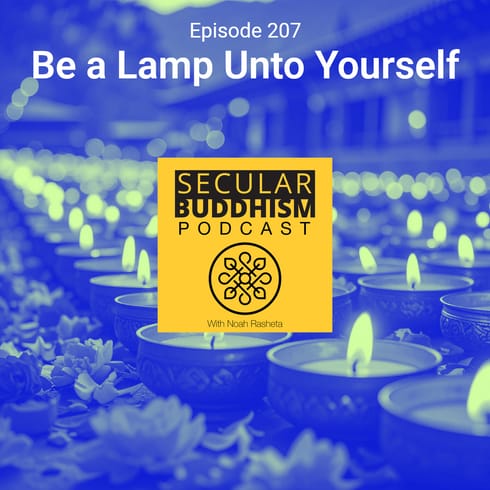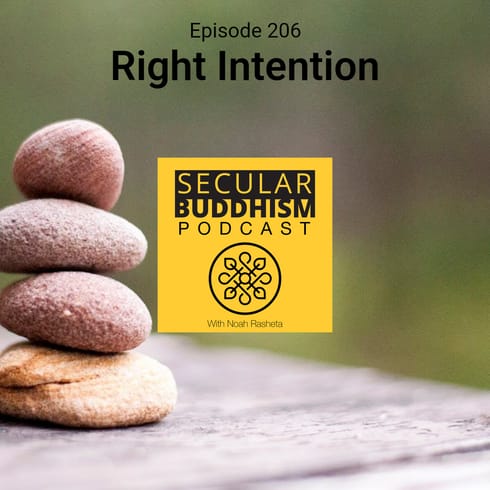
147 - Dharma Cat
Life has a funny way of teaching us lessons even amidst circumstances or events that we don’t particularly find to be pleasant. In this episode, I will share the story of how we ended up with a 3-legged cat as a pet.
Transcript:
Hello, and welcome to another episode of the Secular Buddhism Podcast. This is episode number 147. I am your host, Noah Rasheta. And today, I’m going to talk about the unexpected joy sometimes comes from difficult events. As always, keep in mind you don’t need to use what you learn from Buddhism to be a Buddhist. You can use what you learn to be a better whatever you already are. If you’re interested in learning more about Buddhism, check out my book, No‑Nonsense Buddhism for Beginners on Amazon or check out the first five episodes of the podcast. You can find those first five episodes easily by visiting secularbuddhism.com and clicking on the Start Here link. If you’re looking for a community to practice with and to interact with, consider becoming a patron by visiting secularbuddhism.com and clicking the link to join our community.
For today’s podcast episode, I wanted to talk a little bit about a new pet that I have, a cat named Taz, specifically a three-legged cat. And I want to tell you this story and tie this in with the overall idea that sometimes unexpected joy comes from difficult circumstances or difficult events. I often refer to the analogy of life being like a Tetris game, where the pieces that show up, we don’t necessarily have control over what those pieces are, but when they do show up, we do the best that we can with those pieces to make them fit the best way we can into the game. And before we know it, we’re dealing with new pieces.
And I really like that analogy and I think it’s important to recognize that this isn’t about liking the pieces that we get, it’s about maintaining a little bit of open curiosity, if we want to call it that, to what this piece may bring, rather than being stuck in the moment, thinking, here I am dealing with this piece that I really don’t like. What if I was able to explore a little bit the idea that while I am interacting with this piece that I don’t necessarily like, what could come of this? Sometimes that mental exploration can give us a sense of hope. And I want to talk about that a little bit.
So Taz is the name of our cat. Now, a little bit of backstory here. I am allergic to cats. I am not the person that you would picture having a cat, because first and foremost, I’m allergic to them. And second, I’ve never really identified, I guess, with cats, they seem to be very interesting personalities, they come around when they want something from you and then they’re gone once they get what they want. At least that’s been my perspective of them throughout most of my life growing up. And that’s why I would consider myself much more of a dog person. Now, my wife is even less of an animal person than I am. She is what you would imagine someone who just doesn’t like animals. She’s the last person I would have ever imagined having an animal.
So that’s, in a nutshell, where we were about six months ago. And the kids have always wanted a pet. And we’ve toyed with the idea of one day having an outdoor dog, but it’s too much work for our lifestyle and for where we live, it gets too cold in the winter. It’d be too much work. So we opted to not have a pet dog. My wife grew up with a pet dog, I also grew up with a pet dog. So that would have seemed like the natural fit. But one day, the kids were asking if they could maybe get a cat. So what happened was my wife’s aunt, so their great aunt had a cat who had kittens and she started calling all of the cousins and all of the cousins were suddenly getting cats.
When our kids found out that all their cousins were getting cats, they started begging us if we could go pick up one of these new kittens and they could have a cat. Now my wife jokingly said, “Well, ask your dad.” Knowing that I was for sure going to say no, because I’m allergic to cats. And I surprised everyone by saying, “Well, sure, maybe, we can.” And right away, she looked at me with this look of concern, like, “What are you talking about?” And we decided, well, maybe if it’s an outdoor cat and it lives outside and we just build a little home for it. And we can put in a heated pad and things to help with the temperature, because it does get cold here where we live, that perhaps it would be a wise to have a cat that patrols around the house because we do live in a rural area, out in the fields where there are mice and those mice will sometimes get into the house. So the first line of defense would be an outdoor cat or so we thought.
And with that in mind, the kids were very excited to know we were going to get a cat. So we went up to the aunt’s house to look at these kittens. And she had already given all of the ones she needed to away to all the cousins. And there were two left that she wanted to give away to someone. And we decided it might be best to take two instead of one, because if we got one, it might be lonely outside and run away. And if we had two, they could entertain themselves and would be less likely to run away since they would have each other. So we took the two cats, brought them to the house and our plan started right away with having them live outside.
And within a week and a half or two weeks of having the cats, things were going well, we had to go on a trip. I was doing a paragliding trip in California. And this was last year. I want to say it was August or September. And we took the two cats that were pretty new. They had only been at our house for a couple of weeks to the cousin’s house and ask them to take care of the cats. We didn’t want to leave them here because it was too new of a place for them and we knew it was very likely they would go missing. So we took the cats, dropped them off, went on our trip.
And when we came home from our trip, while we were driving home from our trip, we found out that one of the cats had gone missing. This is Taz, the little male cat, the black cat. So he went missing. We came home. We hadn’t fully bonded with these cats yet. So it was like, well, that’s really sad, however, they were always meant to be outdoor cats. The one cat that was left was the very spunky, vibrant cat that does all the hunting. She had already been catching a lot of mice for us. And we got home. The kids were sad. We didn’t know what happened to Taz. And about two days later, we got a phone call. We found out that when he had gone missing and I must say we spent a lot of time searching the streets around here, out in the fields, calling, leaving food and had no sign of him.
Well, turns out one of the neighbors down the road informed us that he had been hit by a car. And she was the one who found him, he was injured pretty badly. And they took him to the vet and they gave us the information for where he was. So we called, found out where he was and sure enough, he had come in with some injuries, they amputated one of his front legs and he was recovering nicely now. And so we informed them that we were the owners. At this point, there had been a lot of work done to him. And he was now a very expensive cat. And we brought him home. We took care of him. He had to stay in doors. And so long story short, we ended up with a three-legged cat and a lot of high bills. And it was a new experience, whereas, because we didn’t really want the cats in the first place, but here we were now dealing with the discomfort of a situation that we didn’t want to be in.
And what happened next was quite the lesson for us. That’s why I called this episode, Dharma Cat. Dharma is the word used for teachings. And this is the cat that was giving us teachings on the nature of reality. So we took him in, he had to be indoors. We bought a very nice air purifier for allergens. We would run that in our room and I would keep the door closed. And he had a cage outside in the living room area where he was healing from his injuries. Well, in the many weeks that we had him, my wife became a cat person. And to me, that’s the most funny part of this entire story is because, again, if you knew her, I mean, imagine someone who really, really dislikes animals and then imagine that person becoming a cat person.
So that’s what happened to my wife. She befriended and fell in love with this little cat. And luckily his personality contributed to the whole thing, because he’s a very sweet, very mild and tender cat. And we took him into our home and he became part of the family and healed with his missing paw. And fortunately, everything else healed completely. His back paw that had been injured and his right side, everything healed. And he ended up being very much a normal cat who just has three legs instead of four. And he gets around just fine. He’s outside, hunting mice with the other cat.
And this experience has now been, I want to say six or seven months that we have cats. And Taz is our little Dharma cat. He’s the cat that taught us that, he taught me that I can love cats and he taught my wife that she can love animals and that she can love cats. And I’ve thought about this in the months since all this has happened and thought, as we go through life and things happen, we find ourselves in circumstances that we don’t want to be in. And it’s very easy in that moment to want to reject the Tetris piece, to say, this is what I’m dealing with, but I don’t want this.
And had someone told me six months ago, hey, here’s, what’s about to happen. The day I found out that we had to amputate his leg and all this, all this stuff was going to happen with him, had someone told me, but you’ll fall in love with this cat, he’ll teach you a lot about life and about resilience and about mending and about adaptation to life circumstances, I would’ve said, “Oh, okay. I didn’t expect that.” And here I am in the present, looking back, we’re really good at looking back and connecting the dots. Looking back, we can see, oh, okay, I’m glad that that happened because I learned this or this happened or that, but we’re not very good at it in the present moment.
So the concept or the idea I wanted to share in this podcast episode was, what if in the present moment, when confronted with difficult or uncomfortable circumstances, we could recognize that looking-forward, we have uncertainty about what this is going to do for us. And that holding space, that open curiosity may change the relationship we have with the circumstances in the present moment. So for me, one of my common practices in mindfulness or meditation is that in the present moment, I like to look back and see the causes and conditions that allowed this moment to be what it is.
And that’s the practice of looking back, seeing the interdependent nature of things, looking back, connecting the dots backwards. And that’s been a very powerful technique to feel gratitude in the present moment for everything in the past, even the unpleasant moment, but this technique is doing the same thing looking forward. It’s saying in this present moment, whatever this thing is that I’m doing or that I’m going through, what’s going to come of this? I think that would be the question that I would sit with, what will come of this? And the answer is, I don’t know. The uncertainty, I think, is what’s powerful here. So what it leaves you with is possibilities, the open possibility of who knows what will come of this. And it may be pleasant things, it may be unpleasant things, right? You may think it’s bad now. Well, wait, it’s going to get worse. Or you may think it’s bad now, but at the end, this will all be worth it. We don’t know, both scenarios are equally uncertain.
And again, looking back, I can recount so many of the difficult moments of my past, things that I’ve gone through that I would never want to go through again are very directly connected to how things are now. I think of this podcast as an example, had I not gone through the difficulties that I went through in my marriage and in my faith transition back in 2010 to 2012, I would have never explored Buddhism, I would’ve never started a podcast. And now, I hear from people by email all the time who will mention how grateful they are for encountering the podcast or a book or any number of things that I’ve done since that incident that have brought improvement to someone else’s life. And it’s fascinating to think none of that would’ve happened, at least not the way that it did happen, had I not gone through what I went through. And that gives me a sense of gratitude for the difficulties that I’ve gone through.
So again, looking back, that’s become a very natural, easy thing for me to do as part of my practice, but what I’m excited to incorporate into all of this is what happens when I do this looking forward and holding space for that uncertainty of what will come of all this. This has happened in my career, right? I had a business that I really enjoyed having, manufacturing photography accessories and tripods. And little did I know that the difficulty of going through the failure of that company, the collapse of that company out of the ashes of that would rise something that I enjoy even more. I wouldn’t have known that at the time, even had someone told me I would have been like, I don’t know about that. And yet, here I am, now running my flight school and teaching paragliding and paramotoring, something that I almost feel it isn’t fair to call it work. And yet, that’s what I do for work. I would much rather be where I am now than where I was then, but I couldn’t have arrived at this had I not gone through that.
And what does that say of the future? Again, there’s the uncertainty, what if there’s something else that I would enjoy even more? And I don’t know that because I am not there yet, or it could, like I said earlier, it could be something that is much less pleasant and that would lead to something that’s more pleasant, that will lead to something that’s less pleasant, that will lead to something that’s more present. And that’s the point, that life goes on, the Tetris game goes on, pieces show up, and we never know what will come of this piece that is falling right now, the one that we’re dealing with right now in the present moment. And that’s the concept I wanted to share in this podcast episode.
I hope that this is an idea that may resonate for you as you analyze and examine the circumstances that you’re in, whatever those circumstances may be, whether they’re pleasant ones or unpleasant ones, hold space for that question of, I wonder what will come of this? And the moment you bring up that question and you open up your mind to the almost infinite possibilities of what may come of this, I hope that will give you a more open space in your mind to accept what will come next, to see that next piece and not dread it so much, even if it’s going to be an unpleasant Tetris piece that shows up, you don’t know what comes next. And that’ll be the situation that we’re always in, never knowing what comes next. All right. That’s all I have for this podcast episode. I hope you enjoyed this. And I look forward to recording another podcast episode soon. Until next time.



